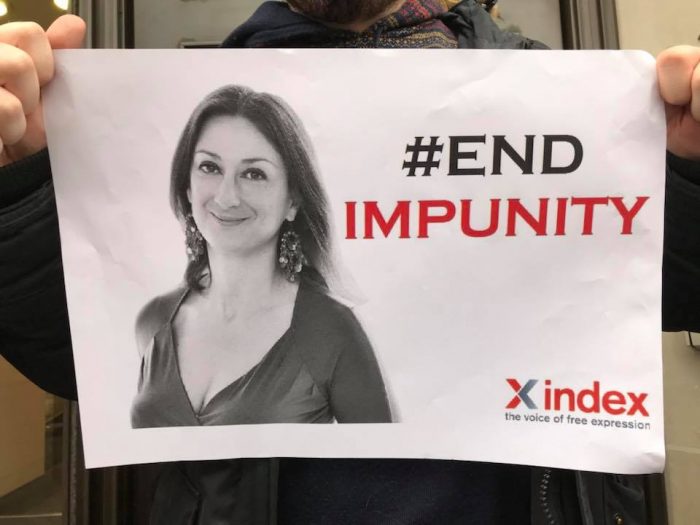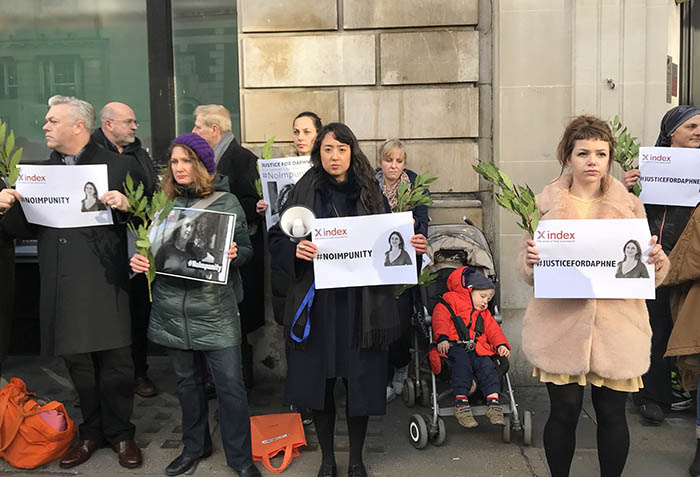Index relies entirely on the support of donors and readers to do its work.
Help us keep amplifying censored voices today.

Slovak investigative journalist Jan Kuciak was murdered in February 2018.
Dear President Juncker,
We, the undersigned organisations, are deeply saddened and appalled by the recent killings of Slovak journalist Ján Kuciak and Maltese journalist Daphne Caruana Galizia. These killings on European soil in retaliation for the investigative reporting by these journalists are simply unacceptable.
We welcome the condemning of these killings by the European Union (EU) institutions. However, we demand that no further time is wasted and these words are followed by action. We urge high-level officials from the European Commission to retain regular communication with senior police authorities in Slovakia and Malta to ensure that police investigations are full, thorough and independent.
Moreover, the European Commission must take the lead and hold state officials and public figures to account for creating an environment in which the critical function of journalism is respected. State officials and public figures should consistently speak out in support of the critical function of journalism and support journalists when they are attacked.
A climate in which impunity prevails and in which journalists are only respected when they serve the interests of those in power, paves the way for violence. These murders signal the urgent need to support civil society in the EU Member States in their efforts to fight impunity, and to document and promote accountability for violations of press freedom.
In today’s world where a journalist is killed every five days with almost full impunity as a result, we have to stop the European region from becoming an environment where journalists are no longer safe to do their work. We call on the European Commission to work, as a priority, with Member States to begin the process of establishing national protection mechanisms for journalists in Europe.

Matlese investigative journalist Daphne Caruana Galizia was murdered in October 2017.
When journalists are killed, they are silenced and the public is deprived of their stories. In the cases of Ján Kuciak and Daphne Caruana Galizia stories about corruption, organised crime and abuse of power. Stories the people have a right to know about.
Safety of journalists is a precondition for good journalism that serves the societies and audiences. Our European democracies cannot thrive when journalists are silenced and cannot inform people about important developments and hold power holders to account.
We urge the European Commission to call on the governments of its Member States to implement without any delay their existing commitments to provide a safe, enabling environment for journalists, flowing from numerous adopted United Nations resolutions on the safety of journalists and the Council of Europe recommendation on the Protection of Journalism and the Safety of Journalists and other media actors.
We urge the European Commission to take the lead in stepping up their efforts to protect journalists within Europe. The undersigned organisations stand ready to support in such efforts.
Your response to the killings of Ján Kuciak and Daphne Caruana Galizia will set a precedent for what is permissible in the European Union. A safe future for journalists in Europe is in your hands.
Yours sincerely,
ARTICLE 19
Committee to Protect Journalists
European Centre for Press and Media Freedom
European Federation of Journalists
European Journalism Centre
La Fundación para la Libertad de Prensa
Free Press Unlimited
Global Forum for Media Development
IFEX
International Federation of Journalists
Index on Censorship
International Media Support
International Press Institute
Rory Peck Trust
Reporters Without Borders
Samir Kassir Foundation – SKeyes Center for Media and Cultural Freedom
Transparency International
[vc_row][vc_column][vc_column_text]
Journalists who dare to investigate powerful people or companies are facing increasingly expensive legal threats to stop them publishing.
Daphne Caruana Galizia, the Maltese investigative journalist who was assassinated in October 2017, was just one reporter who fought against these lawsuits. Strategic Litigation Against Public Participation (Slapp) lawsuits are not new nor are they limited to the media world, but they are incredibly powerful.
Daphne’s son Paul said: “Slapp lawsuits are designed to remove the truth from circulation by making it too expensive to assert. Malta’s political and business elite used them extensively against my mother Daphne Caruana Galizia who always stood her ground but, as an independent journalist, paid a heavy price in terms of stress, time wasted and money spent on her own defence.”
Leading freedom of expression advocates are worried about the power of these lawsuits and the way they are being used to stop publications.
Jodie Ginsberg, CEO of Index, said: “Having a media that is free to investigate corruption and abuse of power – and free to publish the results of those investigations – is fundamental to democracy. These vexatious lawsuits – deliberately aimed at preventing journalists from carrying out such work – must be stopped.”
Jonathan Price, a barrister with Doughty Street Chambers, said: “Media plurality and diversity are essential to a functioning democracy. But bloggers, citizen journalists, small-scale specialist publications and NGOs are most vulnerable to Slapp activity. A large corporate entity or wealthy individual is able to outspend and out-resource these independent media outlets well before any substantive court decision as to the merits of a particular case. All parties are aware of this inequality of arms, and just that simple awareness is enough to deter many small publishers from investigating and reporting on large corporates and wealthy individuals.
He added: “So there is the visible, practical censorship that is achieved by tying media organisations (of all sizes) up in spending time and money on possibly baseless litigation. And there is the self-censorship applied by the smaller publishers so as to avoid the dread of receiving a lengthy, highly aggressive letter from expensive libel lawyers.”[/vc_column_text][/vc_column][/vc_row][vc_row][vc_column][vc_column_text]A small Maltese news outlet, The Shift News, is fighting against Slapps and campaigning for legal changes in Malta to give more protection to journalists covering public interest stories. Opposition MPs in Malta are seeking to use a private member’s bill to change the law to stop international lawsuits being used to prevent Maltese journalists covering stories.
This comes after The Shift News was threatened with a lawsuit for an article about the alleged involvement in a scandal by the company Henley and Partners, which has been awarded a multi-million dollar contract to act as agent for a scheme through which Malta makes European citizenship available. Henley and Partners threatened legal action against The Shift in the UK and the US unless an article about the company’s alleged involvement in a passports-for-cash scandal in Grenada was removed. Henley and Partners deny any wrongdoing. The Shift News refused and instead published the threatening letter.
These kind of lawsuits are a problem in other countries too. For example, Albanian investigative journalists Besar Likmeta and Aleksandra Bogdani were sued for defamation by an influential judge and his wife. The journalists work for reporter.al, an investigative reporters’ platform in the Albanian language.
Fighting such lawsuits is extremely expensive – far too much for all but the largest media outlets. The result is censorship doled out by those with money: news and articles fail to appear, without anyone realising what has happened. Journalists are even told they must not mention these lawsuits or they will face further legal action.
A cross-party group of MEPs are now calling for new EU legislation to deter such lawsuits. “We are committed to the protection of investigative journalists and media freedom across the EU and will pursue this issue until Anti-Slapp EU legislation is in place,” they said.
Flutura Kusari, legal advisor to the European Centre for Press and Media Freedom, said that “in a Slapp lawsuit, the plaintiff does not aim to win a case, rather than to intimidate and discourage reporters from further reporting by placing them in long and costly judicial processes”.
There are some signs that the European Parliament is worried about the problem in a damning report recently published after a delegation of MEPs visited Malta. It identified many failings, including concerns about the effectiveness of the fight against corruption, with few investigations resulting in criminal prosecutions, and the weak implementation of anti-money laundering legislation. “The brutal assassination of Daphne Caruana Galizia was aimed at instilling fear in everyone, especially those involved in investigating and prosecuting cases of money laundering and corruption,” it said.
This is not just a problem in Europe, but in the USA there is some protection for journalists against vexatious legal actions. According to the Reporters Committee for Freedom of the Press, some US states, including California, Georgia and Texas, have laws that discourage lawsuits.
The use of expensive lawsuits to stop journalists reporting a story with a strong public interest is not a new tactic, but we must redress the balance against media investigations.
Joy Hyvarinen is head of advocacy at Index on Censorship[/vc_column_text][/vc_column][/vc_row][vc_row][vc_column][vc_basic_grid post_type=”post” max_items=”4″ element_width=”6″ grid_id=”vc_gid:1516373343229-cbca273b-69ee-8″ taxonomies=”18782″][/vc_column][/vc_row]
[vc_row][vc_column][vc_column_text]
Yesterday marked three months since the murder of Maltese journalist Daphne Caruana Galizia.
Gathering outside the Maltese embassy in Malta House, London, members from Index on Censorship stood with seven other free speech and criminal justice organisations to mark the anniversary and call on the Maltese government to ensure justice is served. I spoke with Hannah Machlin, project manager for Index on Censorship’s Mapping Media Freedom platform, Cat Lucas, programme manager for English Pen’s Writers at Risk programme, and Rebecca Vincent, UK bureau director for Reporters Without Borders for this special podcast.
During the vigil, participants left bay leaves — which in Greek mythology are a sign of bravery and strength — outside the embassy in a sign of solidarity with supporters in Malta, while a statement from Caruana Galizia’s family was read out.

Caruana Galizia was killed on 16 October 2017 when a bomb placed under her car exploded as she was leaving her home in Bidnija, Malta. Sixteen days prior to the fatal attack, Caruana Galizia filed a police report saying she was being threatened.
Through her investigative journalism career, Caruana Galizia exposed corrupt politicians and other officials, uncovering a number of corruption scandals in the Panama Papers. Caruana Galizia also investigated links between Maltese Prime Minister Joseph Muscat to secret offshore bank accounts, to allegedly hide payments from Azerbaijan’s ruling family. Her work on government corruption also led to early elections in Malta in June 2017.
At the time of her death, Caruana Galizia was subject to several libel suits and counts of harassment. Her assets were frozen in February 2017 following a request filed by Economic Minister Chris Cardona and his EU presidency policy officer Joseph Gerada.
Her murder was condemned by many from the international community, with a previous vigil held on the International Day to End Impunity for Crimes Against Journalists, where nearly 60 free expression advocates gathered, calling for justice and an open and transparent investigation into her death.
Malta is currently ranked 47th out of 180 countries in Reporters Without Borders’ 2017 World Press Freedom Index, and 47th out of 176 countries in Transparency International’s Corruption Perception Index 2016.
Seven reports of violations of press freedom were verified in Malta in 2017, according to Index on Censorship’s Mapping Media Freedom project. Five of those are linked to Caruana Galizia and her family.[/vc_column_text][/vc_column][/vc_row][vc_row][vc_column][vc_basic_grid post_type=”post” max_items=”4″ element_width=”6″ grid_id=”vc_gid:1516205516926-5b43be63-70a3-7″ taxonomies=”18782″][/vc_column][/vc_row]
[vc_row][vc_column][vc_column_text]
Around seven free expression and anti-corruption groups, and other supporters gathered in London today to remember investigative journalist Daphne Caruana Galizia three months after her tragic murder in Malta, and to reiterate calls for justice in her case.
Caruana Galizia was killed on 16 October 2017 when a bomb placed under her car exploded as she drove away from her home in Bidnija, Malta. A specialist in investigating corruption, her work included exposés of the shady secret deals, uncovered in the Panama Papers, that show how politicians and others hide illicit wealth behind secret companies. Her allegations about governmental corruption led to early elections in the country in June 2017.
“We gathered to honour a remarkable woman and courageous investigative journalist. We gathered to show the Maltese authorities and the international community that we will not forget Daphne Caruana Galizia, and we will not rest until all those who planned and carried out her attack are brought to justice. We gathered in support of the very principle of press freedom, as an attack against a journalist anywhere is an attack on journalism itself,” said Rebecca Vincent, UK Bureau Director for Reporters Without Borders.
“The corruption Daphne Caruana Galizia exposed affects people across Europe, and as Europeans, we must show solidarity with her family and stand up for the truth. Justice requires not just punishing those guilty of her murder, but also ensuring that her investigations are widely read, both in Malta and across Europe. European leaders must come together to ensure there is no impunity in this case. If not, they send a chilling message that those standing against corruption may be silenced,” said Katie Morris, Head of Europe and Central Asia for Article 19.
“Until all the perpetrators, including possible masterminds, behind the murder of Daphne Caruana Galizia are fully prosecuted, journalists in Malta will work in fear. The UK government must do all it can to ensure this case receives the attention it requires and that, like so many other cases of journalists murdered around the world, justice is not denied,” said Elisabeth Witchel, Impunity Campaign Consultant for the Committee to Protect Journalists.
“Today we come together to pay tribute to Daphne Caruana Galizia and to stand in solidarity with her family. Daphne’s murder was an attempt to silence her but we will not allow that to happen. We will continue to share her words and her work, and to call for a full and impartial investigation into her death,” said Antonia Byatt, Interim Director, English Pen.
“Daphne Caruana Galizia’s heinous murder has cemented a new climate of fear and uncertainty for journalists, threatening the future of free speech in Malta. On the three-month anniversary of Caruana Galizia’s death, we remember her brave and vital work which continues to hold the Maltese authorities accountable. We hope the arrests of her alleged attackers are the run-up to an independent and fair trial to ensure this will not be a grave case of impunity,” said Hannah Machlin, Mapping Media Freedom Project Manager for Index on Censorship.
“Daphne Caruana Galizia’s reporting courageously exposed organised crime and political corruption in Malta. It is vital not only that her terrible murder be fully investigated and those responsible be brought to justice, but also that her legacy in Malta continues, and that corruption and impunity there be rooted out. By gathering to remember her today, we reiterate that those who expose corruption should be protected, not intimidated”, said Patricia Moreira, Managing Director, Transparency International.
Co-sponsors of the London vigil included ARTICLE 19, the Committee to Protect Journalists, English Pen, Index on Censorship, Pen International, Reporters Without Borders, and Transparency International. Participants read a statement from Caruana Galizia’s family and wrote messages on bay leaves in solidarity with her supporters in Malta.
Malta is ranked 47th out of 180 countries in Reporters Without Borders’ 2017 World Press Freedom Index, and 47th out of 176 countries in Transparency International’s Corruption Perception Index 2016.[/vc_column_text][/vc_column][/vc_row][vc_row][vc_column][vc_basic_grid post_type=”post” max_items=”4″ element_width=”6″ grid_id=”vc_gid:1516117019985-986a456a-54fe-4″ taxonomies=”18782″][/vc_column][/vc_row]